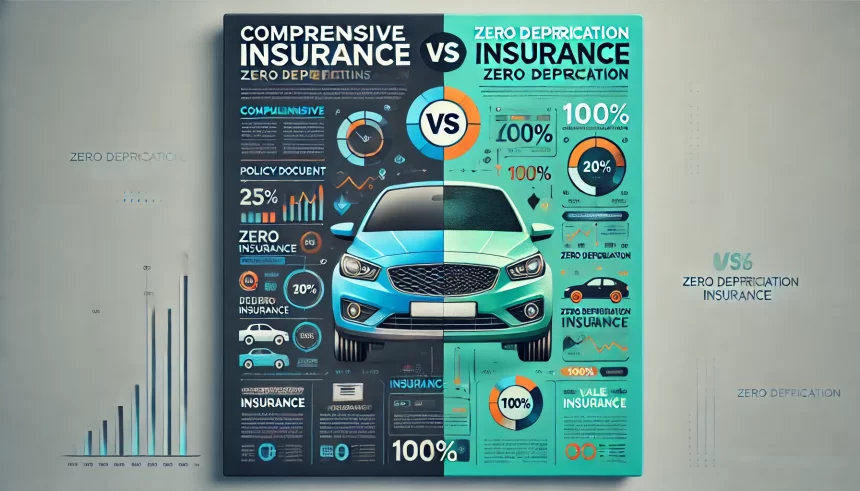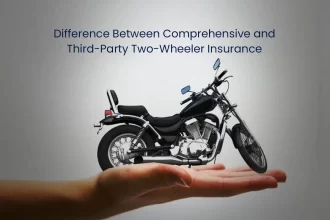When purchasing vehicle insurance, comprehensive insurance vs zero depreciation insurance are mentioned over and over. Each has its own unique set of benefits, coverage options, and cost implications. In this detailed guide, we’ll break down the key differences between comprehensive insurance vs zero depreciation and help you make an informed decision when choosing the right policy for your vehicle.
Introduction to Comprehensive Insurance vs Zero Depreciation
When choosing car insurance, choosing either zero dep vs comprehensive insurance can be difficult. Understanding which one suits your needs best depends on several factors, including the type of vehicle you own, its age, and your driving habits.
So, what is the difference between comprehensive and zero depreciation insurance?
What is Comprehensive Insurance?
Comprehensive insurance is a broad coverage policy that protects your vehicle from multiple potential risks. It not only covers damage from accidents but also extends to other types of losses, such as fire, theft, or natural disasters like floods and storms.
Additionally, comprehensive insurance includes coverage for third-party liabilities, meaning any damage caused to a third party’s vehicle or property is also covered.
Comprehensive insurance offers coverage for:
- Accidental damage
- Theft
- Natural calamities
- Fire
- Third-party liabilities
Example Scenario: Comprehensive Insurance Coverage
If you’re in a car accident and your car is severely damaged, comprehensive insurance covers the repair costs after deducting depreciation. If your car was stolen, the insurer compensates you for the car’s market value before the incident.
What is Zero Depreciation Insurance?
Zero-depreciation insurance is an add-on cover that can be purchased alongside your comprehensive insurance policy. This type of insurance ensures that in case of any claim, the insurer covers the entire cost of repairs or replacements without factoring in depreciation.
In simple terms, it means you will be compensated for the full value of your vehicle or its parts without considering the damage to the parts over time or its current market value.
Coverage Under Zero Depreciation Insurance:
- Full coverage for replacement parts
- Increased claim payout
- Only available for cars up to 5 years old
Example Scenario: Zero Depreciation Insurance Coverage
If your new Skoda Kushaq Onyx is in an accident, zero depreciation insurance covers the full repair costs for parts like bumpers and windshields without deducting depreciation. This saves you from paying out-of-pocket for the depreciated value of parts.
Comprehensive Insurance vs Zero Depreciation: Key Differences
When comparing comprehensive insurance vs zero depreciation, the main difference lies in how the two policies handle the depreciation of your vehicle’s parts.
| Comprehensive Insurance | Zero Depreciation Insurance |
|---|---|
| Covers damages to your vehicle but deducts depreciation costs for parts like plastic, rubber, etc. | Covers the entire cost of replacing parts without considering depreciation. |
| Available for all vehicle ages | Typically offered for vehicles up to 5 years old |
| Lower premium costs | Higher premium costs due to the additional coverage |
| Suitable for older vehicles or cars with high depreciation | Best suited for new or luxury cars with minimal wear and tear |
Cost Comparison: Comprehensive Insurance vs Zero Depreciation
Comprehensive insurance generally comes with lower premiums, while zero depreciation adds to the overall cost of the policy due to the extended coverage it offers.
For instance, a comprehensive insurance policy for a mid-range car may cost around ₹12,000 annually, while adding a zero depreciation cover could increase the premium to ₹15,000 or more. Despite the higher cost, zero depreciation insurance often proves to be cost-effective in the event of major repairs, where the out-of-pocket expenses for depreciation could otherwise be significant.
Also read: The Best Car Tyres in India
Pros and Cons: Comprehensive Insurance vs Zero Depreciation
| Insurance Type | Pros | Cons |
|---|---|---|
| Comprehensive Insurance | Covers various risks such as theft, fire, accidents, and third-party liabilities. | Depreciation is deducted during claims. |
| More affordable compared to zero depreciation. | Higher out-of-pocket expenses for parts like plastic, glass, and rubber. | |
| Suitable for older cars. | ||
| Zero Depreciation Insurance | Full claim settlement without depreciation deductions. | Higher premium costs. |
| Best for newer cars, where parts’ value has not depreciated significantly. | May not be available for older vehicles. | |
| Ideal for people with high-end or luxury vehicles. |
Step-by-Step Guide: How to Choose Between Comprehensive and Zero Depreciation
Step 1: Evaluate Your Vehicle’s Age
If your car is less than 5 years old, opting for zero depreciation makes more sense since the cost of repairs for new parts can be high. For older cars, comprehensive insurance is more cost-effective.
Step 2: Assess Your Driving Habits and Environment
If you drive in areas prone to accidents or damage (such as crowded cities), zero-depreciation insurance offers added peace of mind.
Step 3: Understand the Depreciation Factor
Comprehensive insurance deducts depreciation on parts like plastic, metal, and glass. If you prefer not to pay for depreciation, zero depreciation insurance is the way to go.
Step 4: Calculate the Additional Cost for Zero Depreciation
Determine whether the higher premium for zero depreciation is justified based on your vehicle’s age and condition. It’s especially useful if your vehicle is frequently exposed to damage.
Step 5: Make an Informed Decision
Choose a policy based on your specific needs, taking into account the cost of repairs, vehicle age, and driving conditions.
Conclusion
When weighing comprehensive insurance vs zero depreciation, the choice ultimately depends on your vehicle’s age, your risk tolerance, and your willingness to pay higher premiums for additional coverage.
Zero depreciation insurance is the ideal option for newer vehicles and drivers who want to avoid paying for depreciated parts during claims, while comprehensive insurance offers a more affordable, all-around coverage solution for older vehicles.
We hope we’ve explained comprehensive insurance vs zero depreciation in an easy-to-understand manner. With AUTOLIVENEWS, you can learn about the technical aspects of car ownership, like first-party vs third-party insurance, and also understand mechanical concepts like torque and BHP.
Leave a comment if you enjoyed reading this blog. Let us know what we should cover next!
Frequently Asked Questions
What is the main difference between comprehensive insurance and zero-depreciation insurance?
The main difference lies in how they handle depreciation. Comprehensive insurance deducts the depreciated value of parts during claims, whereas zero depreciation insurance covers the full cost without deductions.
Is zero-depreciation insurance worth it for older cars?
Generally, zero depreciation insurance is more beneficial for newer cars (up to 5 years old). For older vehicles, comprehensive insurance may suffice.
Does zero depreciation insurance cover third-party liabilities?
No, zero depreciation insurance only covers the cost of repairs to your vehicle without considering depreciation. Third-party liabilities are covered under comprehensive insurance.
How much more expensive is zero-depreciation insurance compared to comprehensive insurance?
Zero depreciation insurance typically costs around 15-20% more than a standard comprehensive insurance policy.
Can I switch from comprehensive insurance to zero depreciation insurance?
Yes, you can switch to zero depreciation insurance if your car is eligible (usually less than 5 years old).
Do both policies cover theft?
Yes, both comprehensive insurance and zero depreciation cover theft.
What parts are excluded from zero depreciation coverage?
In some cases, batteries and tires may not be fully covered under zero-depreciation insurance.
How often should I renew zero-depreciation insurance?
Zero-depreciation insurance should be renewed annually along with your comprehensive policy.
What happens if I don’t have zero depreciation insurance for my new car?
Without zero depreciation insurance, you’ll have to bear the cost of depreciated parts during claims.
Can I have both comprehensive and zero-depreciation insurance?
Yes, zero depreciation is an add-on to comprehensive insurance, meaning you must have a comprehensive policy to add zero depreciation coverage.















